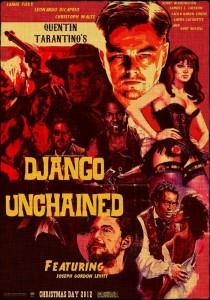Contributor: Henry T.
Written and Directed by Quentin Tarantino
I will admit it immediately: I am an unabashed Tarantino fan. My all-time favorite film is still “Pulp Fiction”. Tarantino may have his share of detractors, but there’s no denying his filmmaking prowess. He has been honing his technique for more than two decades now, and that makes any new release bearing his name a film to look forward to.

“Django Unchained” is, like many films in Tarantino’s diverse canon, an homage to several film genres from the past. The “Kill Bill” films were his salute to the chop-socky martial arts films that Hong Kong has been churning out since the 1970′s. “Inglorious Basterds” was a war film. “Django Unchained” pays tribute to the Westerns that dominated cinema from a half century ago. These were films that were the specialty of Clint Eastwood or John Wayne. As always, there are the signature different elements mixed into the film so that it’s not a traditional Western and more in line with a modern style. You always know what you’re going to get when the Tarantino name is attached to a film.
“Django Unchained” begins in the American South a few years before the Civil War. Django (Jamie Foxx) is a slave whose freedom is bought by a dentist-turned-bounty hunter named Dr. King Schultz (Christoph Waltz). Together, the two of them team up to collect bounties on the heads of numerous criminals in the South. They spend a whole winter doing this for money. When that is over, they set out to find Django’s enslaved wife Broomhilda Von Shaft (Kerry Washington), who is being held in one of the numerous plantations in Mississippi. Specifically, she is being held in the mansion of one Calvin J. Candie (Leonardo DiCaprio). They infiltrate the plantation under the guise of slave buyers who are looking for new brawlers to enter into their fighting business. There is considerable danger involved because they have to hide their true purpose for being on Candie’s plantation.
As any viewer would expect from a Tarantino film, “Django Unchained” contains a copious amount of violence and bloodshed. Tarantino doesn’t hide from this, but like many of his films, the violence and gore is offset by a wicked sense of humor about things. It’s almost as if Tarantino dares his audience not to laugh at the sometimes-ridiculous scenarios that he presents. Django’s offbeat choice of bounty hunter attire at the start could be seen as him somehow trying to be a black Austin Powers, for example. Or the very fact that Calvin Candie’s plantation is aptly named “Candie Land”.
There are scenes that build tension through his trademark colorful dialog (something many filmmakers struggle to do, yet comes so naturally to Tarantino), and it’s defused by a sudden burst of violence or gunplay. One might argue the film relies on this a bit too much but it never allows for boredom to set in. That is crucial since this is a long film at 165 minutes. But time flies. What drives that is the unpredictability with the storyline. Also, Tarantino deals head-on with the issues of racism inherent in the narrative. The n-word is spoken several times in the film and while it’s very uncomfortable to hear in this day and age, it’s a clear reminder that the story is bound in the shameful past of American history. Again, humor offsets a lot of this discomfort. There is a sequence that involves a Ku Klux Klan raid where nearly all of the raiders have problems with the eye holes in their head coverings. It is simply gut-busting.
The film plays with many cinematic stereotypes, and often turns them on their head. Dr. Schultz is strangely articulate and gentile for a bounty hunter. Django morphs from an uneducated slave to a dangerous gunslinger within the course of the film. His wife’s last name infers that she’s a direct ancestor to Detective John Shaft, and Django’s hero arc does reflect what Shaft does in the future. Things could have proceeded in a straightforward manner in Candie Land, but that’s not the case. Schultz and Django have to navigate a minefield of obstacles in order to successfully get Broomhilda off the plantation. This includes a gang of hick gunslingers who operate as Calvin’s personal bodyguards and his personal head house slave Stephen (a nearly unrecognizable Samuel L. Jackson), who is suspicious of Django from the start.
Candie himself is an oily, reprehensible chief villain, prone to explosive violence hiding behind a hospitable Southern demeanor. He takes delight in torturing slaves and treating them (well, besides Stephen, who is just as evil as Candie is) like disposable pieces of meat. Both Django and Schultz face their ups and downs while at Candie Land. There’s always the risk that neither will get out of there alive. The one thing I may have an issue with is the relatively lightweight relationship between Django and Broomhilda. I didn’t feel a deep love connection between them, but that’s a somewhat minor detraction from a great film.
The ending is especially surprising and also very satisfying. The long running time ensures that the audience spends a good amount of time getting to know these characters, understanding their relationships, and wondering if there is a “happy” end to all of it, so to speak. It’s yet another entertaining film from the productive mind of a filmmaker who clearly knows and loves all kinds of cinema. We’re only too happy to share in his enthusiasm for that cinema every couple of years.
Score: 9/10

